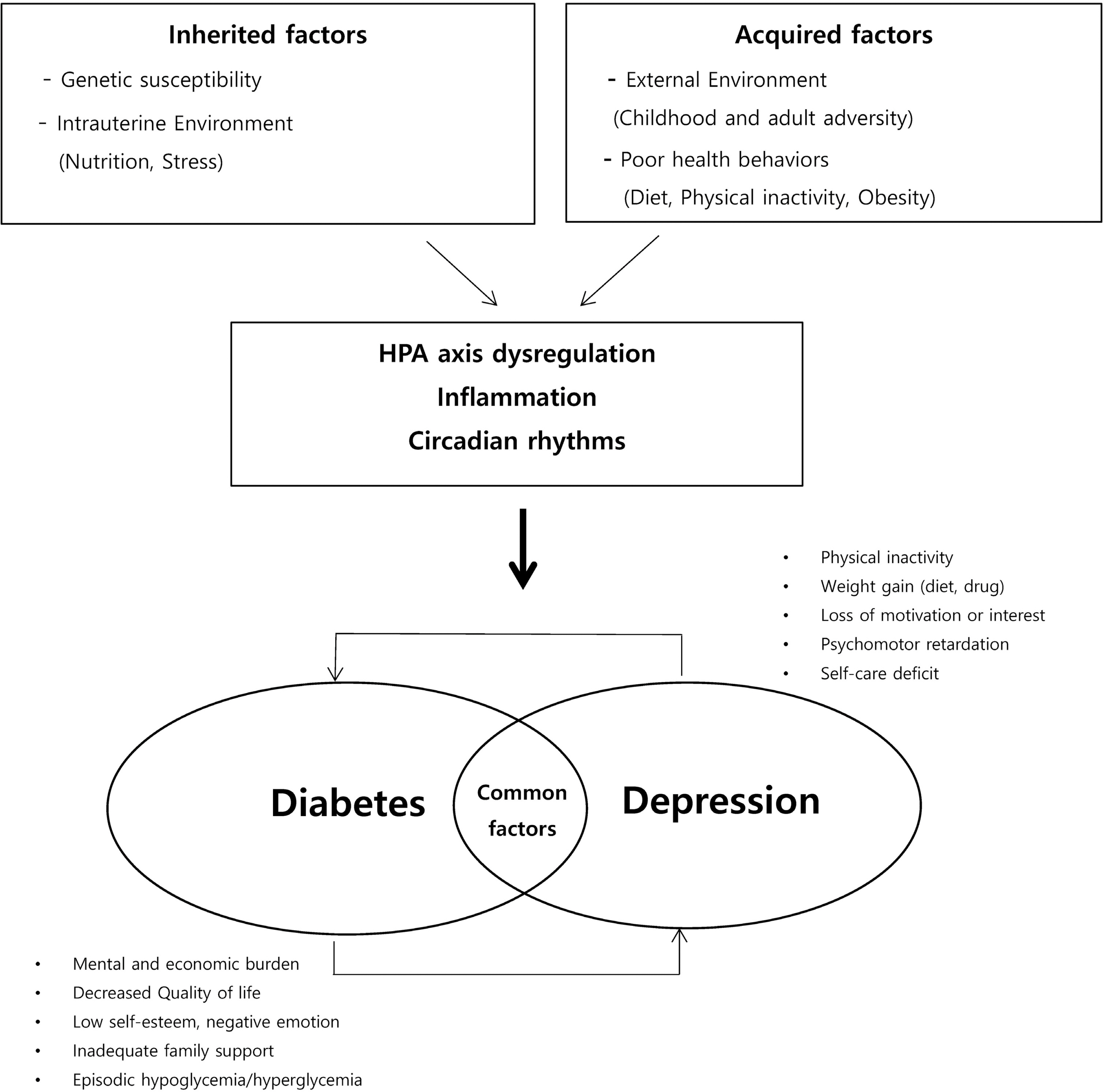J Korean Diabetes.
2022 Sep;23(3):178-184. 10.4093/jkd.2022.23.3.178.
Depressive Disorder and Diabetes
- Affiliations
-
- 1Division of Endocrinology and Metabolism, Department of Internal Medicine, Daegu Catholic University Hospital, Daegu Catholic University School of Medicine, Daegu, Korea
- KMID: 2534303
- DOI: http://doi.org/10.4093/jkd.2022.23.3.178
Abstract
- As a result of their increasing prevalence, diabetes and depression, together with population growth and aging, are growing public health concerns. Diabetes and depressive disorder may occur on the basis of a common pathophysiology and interact with each other. Complex environmental, social, behavioral, and emotional factors influence diabetes care. In particular, maintaining psychological well-being for people with diabetes is the foundation for achieving diabetes treatment goals and satisfactory quality of life. An improved understanding of depressive disorder and diabetes may potentially lead to early detection, and timely treatment planning may simultaneously prevent the onset of depression. Ultimately, this can build positive health behaviors and optimizing medical outcomes for living with diabetes.
Keyword
Figure
Reference
-
1.Young-Hyman D., de Groot M., Hill-Briggs F., Gonzalez JS., Hood K., Peyrot M. Psychosocial care for people with diabetes: a position statement of the American Diabetes Association. Diabetes Care. 2016. 39:2126–40. Erratum in: Diabetes Care. 2017. 40:287Erratum in: Diabetes Care 2017;40):726.
Article2.USV Pharmaceutical Corporation. Diabetes: a medical od-yssey. Tuckaho: USV Pharmaceutical Corporation;1971.3.Korean Diabetes Association. Diabetes. 5th ed.Seoul: Panmuneducation;2018.4.Jeon EJ. Diabetes and depression. Yeungnam Univ J Med. 2018. 35:27–35.
Article5.Dejgaard A., Gade A., Larsson H., Balle V., Parving A., Parving HH. Evidence for diabetic encephalopathy. Diabet Med. 1991. 8:162–7.
Article6.Jesulola E., Micalos P., Baguley IJ. Understanding the pathophysiology of depression: from monoamines to the neurogenesis hypothesis model - are we there yet? Behav Brain Res. 2018. 341:79–90.
Article7.Anderson RJ., Freedland KE., Clouse RE., Lustman PJ. The prevalence of comorbid depression in adults with diabetes: a meta-analysis. Diabetes Care. 2001. 24:1069–78.8.Gendelman N., Snell-Bergeon JK., McFann K., Kinney G., Paul Wadwa R., Bishop F, et al. Prevalence and correlates of depression in individuals with and without type 1 diabetes. Diabetes Care. 2009. 32:575–9.
Article9.Winkley K., Ismail K., Landau S., Eisler I. Psychological in-terventions to improve glycaemic control in patients with type 1 diabetes: systematic review and meta-analysis of randomised controlled trials. BMJ. 2006. 333:65.
Article10.Tabák AG., Akbaraly TN., Batty GD., Kivimäki M. Depression and type 2 diabetes: a causal association? Lancet Diabetes Endocrinol. 2014. 2:236–45.
Article11.Knol MJ., Twisk JW., Beekman AT., Heine RJ., Snoek FJ., Pouwer F. Depression as a risk factor for the onset of type 2 diabetes mellitus. A meta-analysis. Diabetologia. 2006. 49:837–45.12.American Diabetes Association Professional Practice Committee; American Diabetes Association Professional Practice Committee., Draznin B., Aroda VR., Bakris G., Ben-son G, et al. 5. Facilitating behavior change and well-being to improve health outcomes: Standards of Medical Care in Diabetes-2022. Diabetes Care. 2022. 45(Suppl 1):S60–82.13.Korean Neuropsychiatric Association. Textbook of neuro-psychiatry. 3rd ed.Seoul: iMiS company;2017.14.American Psychiatric Association. DSM-5. Diagnostic and statistical manual of mental disorders. 5th ed.Kwon JS, Kim JJ, Namgung G, Park WM, Shin MS, Yoo BH, editors. Seoul: Hakjisa;2015. c2013.15.Lustman PJ., Anderson RJ., Freedland KE., de Groot M., Carney RM., Clouse RE. Depression and poor glycemic control: a meta-analytic review of the literature. Diabetes Care. 2000. 23:934–42.
Article16.Park HS., Hong YS., Lee HJ., Ha EH., Sung YA. The association between depressive symptoms and glycemic control in the patients with diabetes mellitus. Korean J Med. 2003. 64:204–11.17.Lin EH., Rutter CM., Katon W., Heckbert SR., Ciechanows-ki P., Oliver MM, et al. Depression and advanced complications of diabetes: a prospective cohort study. Diabetes Care. 2010. 33:264–9.18.Zhang X., Norris SL., Gregg EW., Cheng YJ., Beckles G., Kahn HS. Depressive symptoms and mortality among persons with and without diabetes. Am J Epidemiol. 2005. 161:652–60.
Article19.Myers BA., Klingensmith R., de Groot M. Emotional correlates of the COVID-19 pandemic in individuals with and without diabetes. Diabetes Care. 2022. 45:42–58.
Article
- Full Text Links
- Actions
-
Cited
- CITED
-
- Close
- Share
- Similar articles
-
- Comparison of Clinical Characteristics among Anxiety Disorder, Depressive Disorder, and Co-morbid of Anxiety Disorder and Depressive Disorder with MMPI-2-RF
- Comparison of Depressive Symptoms between Social Anxiety Disorder and Panic Disorder
- Electroencephalographic Alpha Asymmetry in Major Depressive Disorder Patients With Anxiety Symptoms
- A Case of Bright Light Therapy in a Treatment Resistant Patient with Major Depressive Disorder
- Treatment of depression


